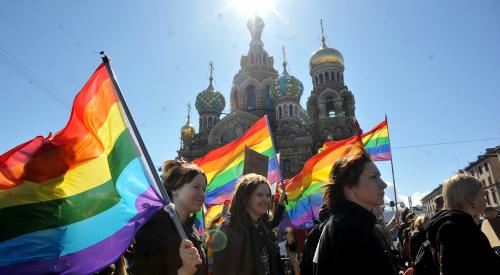- About
- Topics
- Picks
- Audio
- Story
- In-Depth
- Opinion
- News
- Donate
-
Signup for our newsletterOur Editors' Best Picks.Send
Read, Debate: Engage.

| topic: | Digital Rights |
|---|---|
| located: | Russia |
| editor: | Andrew Getto |
For Russian security agencies, the internet provides a steady flow of crime cases as they scan through social media and hand out prison terms for Instagram posts and memes. Why do they resort to finding crime online, where there is hardly any?
For example, on one November night in Moscow, an inebriated Russian student urinated on a portrait of a World War II veteran and posted the video on Instagram. The next morning, the Investigative Committee launched a case and the 19-year-old was arrested. He now faces up to five years behind bars as he is charged with justification of Nazism.
The prosecution maintains that Nazi ideology, not a flash of alcohol-induced recklessness, drove the young man to violate public order. However, nothing backs up this theory, just like in the case of another suspected Nazi, a homeless man who tried to dry his socks on the World War II Eternal Flame. Such exaggerations of charges are not surprising anymore. A decade of ridiculous cases built on online content has destroyed any credibility in Russian courts and law enforcement.
One could find a rational explanation to this when looking back to the years of mass protests between 2011-2012, during which the Kremlin saw the power of millions of citizens who openly opposed the government online. The authorities then realised that they could prosecute almost anyone for angry words or funny pictures they shared on social media, which helps spread fear of speaking out, and hence creates less problems for the regime. By the end of the 2010s, about one hundred people per year were sentenced as extremists and the public largely accepted that you could go to jail for a simple repost.
But the cases kept getting more absurd. Recently, a popular YouTuber, Yuri Khovansky, was arrested for performing a disrespectful song about the 2004 terrorist attack in Moscow. The investigators were not impressed with the fact that the video was uploaded years before the anti-extremism laws came into place. Then, a number of people who took lewd photos outdoors were prosecuted since there were churches in the frame, which offended others’ religious beliefs. This time, it’s more difficult to come up with a rational explanation, but another part of Russian police customs could explain it.
For decades, Russian police and security agencies have been working under the so-called “bars” system. This concept suggests a simple method of estimating the success in the fight against crime: every year, there should be more cases, or bars, crossed than in the previous year. This could be why the Investigative Committee and the FSB spend their days figuring out how to jail more people for their online posts. They don’t act alone - they have an army of pro-government activists lurking the web, improving the statistics.
Two generations grew up with a free, unmonitored internet in Russia. They’re not used to fearing about their online behaviour - yet it has become a real danger. This week, the FSB arrested 106 people, whom they claim are part of an online Nazi gang, trained for terrorist attacks by Ukraine. Since terrorist cases are classified, we will probably never know for sure how many of these people are actual potential serial killers and how many are just reckless kids. Minors are particularly vulnerable online: the FSB has arrested dozens of schoolchildren, in many cases baselessly accusing them of planning school shootings.
Social media can be really helpful under a functioning rule of law. Any Russian security officer could watch the investigations of Alexei Navalny and pick up one hundred huge corruption cases. But under the current ruling regime, they’d rather spend their time finding misdemeanours on Instagram.
Photo by Don Fontijn
